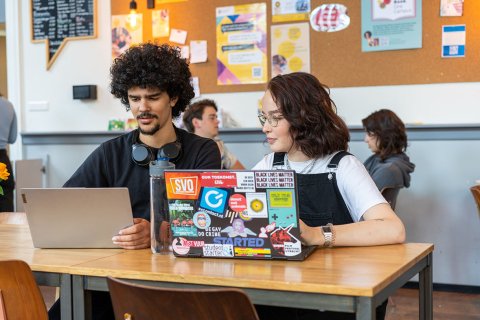Study programme
The Master's programme History of Politics and Society comprises one year (60 EC). A study year is divided into two semesters, running from September until January and from February until June. A semester is divided into two study periods.
Curriculum
The programme consists of compulsory courses, electives, an internship and a thesis. Check the study schedule (PDF).
Semester 1 | Study period 1
In the first study period, you take the following courses:
- 'Cities, States, and Citizenship' (in English and in Dutch), which discusses the historical development of institutions in modern society.
- 'Politics and Society in Comparative Perspective' (in English and in Dutch), in which you learn to apply comparative research methods.
- One of three electives: ‘Growth and Inequality, 1000 – 2000’ (in English), ‘Crisis! Kwetsbaarheid en veerkracht van pandemie tot recessie’ (in Dutch), or ‘Capitalism and Colonialism 1700-2000’ (in English).
Semester 1 | Study period 2
In the second study period, you will take the following courses:
- ‘Politics and policy of sustainability’ (in English and in Dutch), in which you will acquire the basic skills necessary for policy making.
- ‘Themes in the History of Politics and Society’ (in English and in Dutch), in which you develop the design for your MA thesis.
- One of three electives: ‘The Politics of History’ (in English), ‘Democracy and Democratisation’ (in English), or 'Het spel van de macht. Den Haag achter de schermen' (in Dutch).
Finally, in the first semester you will participate in the career seminar, a combination of workshops helping you to prepare for the labour market, other trainings and a meeting with alumni.
Semester 2 | Internship or Politics and Society lab
In the second semester you will do an internship, which comprises an individual assignment at an academic level pertaining to a societal or political issue. An alternative for the internship is a Politics and Society lab: a project that allows you, in cooperation with a small group of fellow-students, to chart a current-day political or societal debate from a variety of angles and to record your findings in an advice or report.
Semester 2 | Master's thesis
In the second semester you also write your thesis, the concluding component of the Master’s programme. Recent thesis topics include:
- Credit to Society
- Neoliberalism
- Tradition and Modernity
- Reforms
- Political Parties and Contemporary Democracy
- Equality, Race, and Racism
Part-time
Part-time students attend the same courses as the full-time students do, but their programme is spread over two years instead of one.
Thesis Award

MA student Jarne van der Poel has won the Faculty of Humanities Thesis Award 2023 for his thesis "Heerma, Not Like This!": Social Housing, Neoliberal Reform and Resistance in the Netherlands 1986-1995.

Educational methods
- seminars
- internship or lab
- self-study
Almost all of the courses in the first semester consist of seminars, in which you will actively participate. Occasionally there will be a group assignment, in which you will learn to conduct research and/or give presentations as a group.
However, most assignments will be individual assignments. These may include research papers, book reviews, valorisation assignments or policy analyses. You prepare for the seminars individually, at home or in the library, reading the literature, working on assignments, or collecting and analysing data.
While writing your thesis, you will largely work independently, but you will have regular meetings with your thesis supervisor and with your fellow-students to discuss your progress.
Internship
An internship gives you the opportunity to learn how to apply academic skills and knowledge in real-life situations and to gain practical experience in your field, in order to prepare you for employment after graduation. Students of the programme have, for instance, worked as interns at the Ministry of Internal Affairs, the city of Rotterdam, BNR News radio, and several political parties.
Keep in mind that most organisations in the Netherlands use Dutch as their working language. However, you can also do an internship abroad, at a research project at a university or at an international organisation.
Politics and Society Lab
Instead of an internship you can do the Politics and Society Lab, a group project. Together with two or three other students, you will - supervised by one of your teachers - dig into a recent social or political debate that is connected to one of the core themes of the Master's programme. You will not just analyse the debate from various angles - political, social, juridical, financial - but also contribute to it. Some examples: tracing and analysing existing (research) reports, doing interviews or working with questionnaires, or attending debates in parliament.
Podcast on algorithms

The role that algorithms play in our society is becoming increasingly important; therefore, the topic is also becoming interesting for researchers from the humanities and social sciences. For their project in the Politics and Society Lab, four Master's students developed a podcast about the influence of algorithms on the relationship between government and citizens.
Examinations
- active participation in seminars
- oral presentation
- research paper
- brief paper, oral or written book report
- valorisation assignment or policy analysis
- internship report (or practicum report)
- internship product (or practicum product)
- thesis
The core courses of the programme are bilingual, which means our students have the right to be assessed in Dutch.
Extra opportunities
For students looking for an extra challenge in addition to their Master's, there are several options. Utrecht University offers several honours programmes for students looking for an extra challenge. Honours education is followed on top of your regular Master's programme and goes beyond the regular curriculum. Honours programmes are available at interdisciplinary level and allow you to work on projects that transcend your own discipline.

